Chapter 10: Events &
Encounters
-
Chapter 10: Events &
Encounters
-
|
|
|
|
|
|
|
|
|
|
|
|
|
|
|
|
|
|
Of more concern to the PCs are events that
happen infrequently, but have more impact on the PCs.
When a group of bandits
decides to establish a base in the PCs' home
province, it is quite possible the PCs
may become involved. Caravans will need guards and
rewards may be offered for the heads of
the villains. Still, such events
do not happen every day or life would
become just too exciting. Secondary events
occur at most once a month.
On the road and at home, many events occur
daily. Often these are insignificant and trivial. Sometimes
they provide the characters with information,
ideas, help, or clues. More often than not, they lead to action and
adventure. A bandit party descends on
the PCs as they camp and a sharp skirmish ensues. The
man-eating tiger prowls the forest looking
for a kill. Such events are checked for daily, or perhaps several times
a day in particularly dangerous areas.
Finally, there are places where the PCs
are involved in time-consuming and thorough
investigation. In these places, several
things may happen to the PCs in the course of an hour.
Sneaking through a ninja
village or poking around the ruins of a haunted temple are particularly
dangerous
activities. Things happen at a much quicker
pace. In such situations, encounter checks are made several times an
hour.
The encounter system in OA
combines events of a grand scale with those of everyday
occurrence. All events are organized into
groups that determine how often they are checked for. Major events
occur once a year, if at all. Secondary
events are checked for every month. Daily and hourly events are checked
for as needed.
Of these events, the DM should determine
the major and secondary events at the start of play and at the
beginning of every game year thereafter.
The DM has the freedom to do many things by determining the events
in advance. He can prepare new campaign
materials in anticipation of the event (preparing modified maps for a
major earthquake), minimizing the amount
of delay and "winging it" that would occur. He can begin to
introduce the factors leading up to the
event into his campaign (the different forces in a war and the rumors of
impending war). He can arrange to have
the PCs in the right place at the right time. It may be that
the player characters are soldiers or
commanders of an army about to go to war or courtiers of a prince soon
to
be assassinated. In this way the player
characters are prepared to take their roles in the coming action. Finally,
determining the events in advance allows
the DM to appear omniscient fate, divination, and other spells can be
answered with a certain degree of confidence.

In ancient times, one of the great emperors
of Shou Lung devised a calendar to
fix the occurrence of
regular holidays and festivals. This calendar
has been highly successful and is commonly used throughout all
the civilized lands of Kara-Tur.
Listed below are the months of the calendar and some of the special holidays
and festivals of the various lands of
Kara-Tur.
The first of the year falls sometime in modern-day February or
March.
| Month | No. of Days | Festivals, Fests, and Holy Days |
| Tsou | 30 | New Year's Festival, God of Heaven, Feast of Lanterns, God of Spring, God of Wealth, Fertility Festival, God of Happiness, God of Learning |
| Ju | 30 | God of North, Goddess of Mercy |
| Yu | 30 | God of Central Mound, Queen of Heaven, Cherry Blossom Festival |
| Kao | 30 | God of Medicine, God of South |
| Kao II | 29 | Thunder God, Dragon Boat Festival, God of War |
| Chu | 30 | - |
| Hsiang | 29 | God of Fire, Purification Festival |
| Chuang | 30 | Moon Feast Festival, God of Land and Grain, God of Furnace, Great Sage's Birthday |
| Hsuan | 30 | Wine God, Yang Feast, Polar Gods, God of Wealth |
| Yang | 29 | God of Disease |
| Ku | 30 | - |
| Tu | 29 | King's Festival |
Festivals are celebrations that last several
days, possibly even weeks.
Feasts are just that, reasons to gather
together for as sumptuous a banquet as can be afforded.
Holy days may or may not be observed--thisgreatly
depends on the religion of the area and the character of the inhabitants.
Observances are simple, often used as
an excuse to have a feast.
Q: The calendar on
page 107 is about
two weeks short. Where did
the
extra time go?
A: The Kara-Tur calendar
is 356 days long,
making it nine days short
when compared
with the calendar of the
FORGOTTEN
REALMS setting on the very
same planet.
"Just
Making Time," an article in
DRAGON® issue #123,
provides a quick
solution for this problem.
A nine-day
festival is held between
the consecutive
months of Tu and Tsou, belonging
to no
month, which can be extended
for one day
every four years by imperial
decree (accounting
for leap years). The Kara-Tur
zodiac has a celestial space
unclaimed by
any other constellation,
matching this gap
in the calendar.
(151.9)
Table 71: YEARLY EVENTS
| Die Roll | Event |
| 1-10 | Ambassador |
| 11-15 | Assassination of a Lord |
| 16-30 | Birth |
| 31 | Comet |
| 32-40 | Death of a Lord |
| 41-43 | Earthquake, Major |
| 44-47 | Famine |
| 48-52 | Fire, Major |
| 53-57 | Flood |
| 58 | Incursion, Major |
| 59-68 | Marriage |
| 69 | New Religion |
| 70-74 | Plague |
| 75-78 | Political Plot |
| 79-85 | Rebellion |
| 86 | Tsunami |
| 87 | Visitation |
| 88 | Volcano |
| 89-00 | War |
When determining events, the yearly event
(if there is any) must always be determined first. Once it is
known, it remains in effect for the entire
year-there is only one yearly event in a given year. The yearly event
will often determine the type of monthly
events that occur.
Yearly events are normally figured only
for the campaign area. Thus if the player characters are on the
island of Kozakura, a yearly event is
determined for Kozakura only. However, if the player characters are
expected to travel a great deal or if
there are several groups of player characters at different points in the
campaign world, the DM should determine
the yearly event for every land where the player characters are
involved. If the PCs begin in Kozakura
but are expected to travel to Shou Lung, a yearly event
should be determined for both lands.
Once the DM knows the yearly event, 1d12
should be rolled to find the month the event occurs in or
begins. Some events, such as an earthquake,
occur in a short period of time. A war, however, can last several
months for a single campaign season. The
exact description of the event will give a range of time over which it
will occur. After determining what month
the yearly event occurs in, check to see what the monthly events will
be, if any.
Table 72: MONTHLY EVENTS
| Die Roll | Assassination,
Incursion, Political Plot, Rebellion, War |
Natural
Disaster |
Other |
| 01-05 | Accident | Accident | Accident |
| 06-07 | Bandit Activity | Bad Harvest | Bad Harvest |
| 08-10 | Bandit Activity | Bad Harvest | Bad Harvest |
| 11-15 | Birth | Bad Harvest | Bandit Activity |
| 16-20 | Death | Bad Weather | Birth |
| 21-22 | Excessive Taxes | Bad Weather | Birth |
| 23-25 | Excessive Taxes | Bandit Activity | Birth |
| 26-27 | Famous Person | Bandit Activity | Death |
| 28 | Fire, Major | Bandit Activity | Death |
| 29-30 | Haunting | Bandit Activity | Death |
| 31-32 | Horrendous Monster | Bandit Activity | Famous Person |
| 33 | Horrendous Monster | Birth | Famous Person |
| 34-35 | Incursion, Major | Birth | Famous Person |
| 36-37 | Incursion, Major | Birth | Fire, Minor |
| 38-40 | Incursion, Major | Death | Fire, Minor |
| 41 | Incursion, Major | Death | Haunting |
| 42-43 | Incursion, Minor | Death | Haunting |
| 44 | Incursion, Minor | Death | Injustice |
| 45-49 | Incursion, Minor | Earthquake, Minor | Injustice |
| 50 | Incursion, Minor | Excessive Taxes | Injustice |
| 51 | Incursion, Minor | Excessive Taxes | Maiden of Virtue |
| 52-54 | Injustice | Excessive Taxes | Maiden of Virtue |
| 55 | Major Battle | Fire, Minor | Maiden of Virtue |
| 56-60 | Major Battle | Fire, Minor | Maneater |
| 61 | Notorious Criminal | Flooding | Marriage |
| 62-65 | Recruiting | Flooding | Marriage |
| 66 | Recruiting | Flooding | Marriage |
| 67-68 | Troop Movements | Haunting | Marriage |
| 69 | Troop Movements | Haunting | Notorious Criminal |
| 70-71 | Troop Movements | Horrendous Monster | Notorious Criminal |
| 72-73 | Uprising | Horrendous Monster | Notorious Criminal |
| 74-78 | Uprising | Injustice | Notorious Criminal |
| 79-80 | Vengeful Stranger | Landslide | Vengeful Stranger |
| 81-82 | No Event | Landslide | Vengeful Stranger |
| 83 | No Event | Maneater | Vengeful Stranger |
| 84-87 | No Event | Maneater | VIP Visit |
| 88-92 | No Event | Plague | VIP Visit |
| 93 | No Event | Uprising | No Event |
| 94 | No Event | VIP Visit | No Event |
| 95-100 | No Event | No Event | No Event |
Table 72: Monthly Events is organized into
three columns. The first column is used during months of
armed violence or its potential-war, uprisings,
assassinations, and political power plays. The second column is
used in months of natural disasters and
their aftermaths (as specified by the exact description)--floods,
typhoons, droughts, famines, plagues
and the like. The third column is used when all is right with the world,
no
calamities or armed insurrections are
occurring. As each event is determined, the DM should note it down on a
sheet of paper next to the proper month.
The DM is free to change any event he feels is inappropriate, especially
when compared to the other events of the
year. In addition, the list of events given is only a small selection.
The
DM is, as always, encouraged to add his
or her own creativity to the possible selections.
The events of a year for
a group of PCs in the empire of T'u Lung might be constructed as
follows: The DM first rolls
for the main event of the year and obtains an 82, Rebellion. The month
of the
outbreak is determined on
1d12, obtaining a 5. One of the provinces of T'u Lung will rise in rebellion
during the
month of Kao II. Looking
at the calendar, the DM decides the plotters of the rebellion will time
their uprising to
coincide with the Dragon
Boat Festival, hoping to catch the government off-guard. Reading the description
of
Rebellion, he finds that
it will last for 1d6 months and rolls a 3. He decides the outcome will
be that the rebels
will be beaten in the end
by the government troops. The events for the first four months of the year
are
determined on the third
column of Table 72: Monthly Events. The next three months are determined
on the first
column and the last months
use the third column again. Making the appropriate die rolls, the DM determines
the
following events for the
year.
| 1. | Tsou | Famous Person |
| 2. | Ju | VIP Visit |
| 3. | Yu | Bandit Activity |
| 4. | Kao | Bandit Activity |
| 5. | Kao II | Rebellion; Incursion, Minor |
| 6. | Chu | Bandit Activity |
| 7. | Hsiang | Recruiting |
| 8. | Chuang | Injustice |
| 9. | Hsuan | Accident |
| 10. | Yang | Haunting |
| 11. | Ku | Bandit Activity |
| 12. | Tu | Marriage |
Finally, after reading the
description of each event, the DM creates a story framework to explain
the events.
At the beginning of the
year, a powerful wizard, leader of a secret society, visits the province
where he and his
fellow members lay the groundwork
plans for the rebellion to come. After his visit, an imperial censor (a
powerful official somewhat
like a member of the secret police) pays call on the ruler of the province
to check
out reports of discontent,
but learns little. In the next two months, bandits in the mountains become
more
aggressive and dangerous.
Actually they are members of the secret society, testing the defenses and
fighting
ability of the soldiers
of the province.
In the month of Kao II, these
bandits are joined by a strong force of soldiers from a neighboring warlord
and
together they arouse dissatisfied
peasants and blackguards to rise against the government. At first they
are
successful, however, they
quickly suffer setbacks.
In the month of Chu, the
rebels retreat into the mountains and continue their raids, harrying the
government forces. Finally,
the government conscripts all the able-bodied men it can find and drives
the rebels
out of their mountain strongholds.
The rebellion is broken, although many rebels escape. With the end of the
rebellion, the government
launches reprisals against those suspected of aiding the rebels-executing,
imprisoning
and banishing entire families.
Alas, many use this as an excuse to settle old scores or steal property.
Many
innocent people are accused.
In the month of Hsuan, a
bridge collapses and several unfortunates plunge to their death. The next
month rumors abound that
the site of the bridge, now being rebuilt, is haunted by those who died.
The bridge
cannot be completed until
the matter is resolved.
In the month of Ku bandits
once again return to the hills, sponsored by the same neighboring warlord
who secretly aided the rebellion.
Finally, all is put to right as the governor of the province manages to
arrange a
marriage between one of
his daughters and one of the sons of the warlord. It is an occasion of
great celebration
and feasting, ending the
year on a happy tone.
The events of the above year
provide many opportunities for player character involvement at all levels.
High-level characters may
become caught up in the intrigue of the rebels and the visit of the imperial
censor or
may command forces sent
to crush the rebellion (or be part of the rebellion). Mid-level characters
may be
rebels, secret aides of
the censor, commanders of smaller units of government troops, supervisors
of the
rebuilding of the bridge,
or ambassadors to arrange the marriage. Low-level characters may be guarding
a
caravan attacked by bandits,
spying for the rebels, impressed into government service, or present when
the
bridge collapses. By knowing
these events in advance, the DM is able to prepare adventures for his characters
that involve these events.
Always remember that the events of a year
do not take into account the actions of the PCs.
It is possible (and not unlikely for high-level
PCs) that the PCs could change the
outcome of many events. In the above example,
the PCs might dig up enough evidence for the
censor to prevent the rebellion, lead
the rebellion to success, prevent the outbreak of cruelty and injustice
that
follows it, or spoil the marriage plans
of the governor and the warlord. When the PCs do cause a
change of events, the DM should be ready
and willing to change the course of events for the remainder of the
year. Often the new events will be obvious
and the DM can decide what the changes will be. Other times the
events can simply be rerolled. However,
the yearly event is never rerolled. If the PCs manage to
prevent the yearly event (the rebellion
in the above example), no yearly event occurs for that year.
Explanation of Yearly Events
Ambassador:
An ambassador arrives from (50%) or is sent to (50%) another land. The
ambassador
remains for 3d10 months. Ambassadors are
sent for a variety of reasons-to prevent war, form a .military
alliance, arrange a marriage, pay tribute,
promote trade, or gain culture. Their arrival is always a major event for
those of the court, accompanied by ceremonies
and banquets. There is a 10% chance that any arriving
ambassador is a gajin from the distant
lands beyond Kara-Tur.
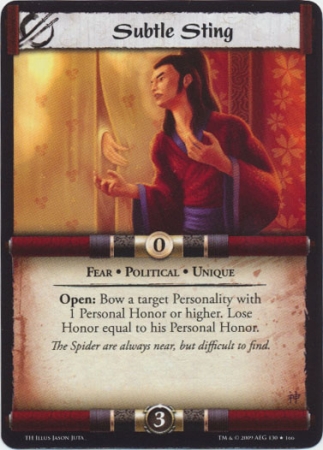
A high-ranking lord is assassinated.
High ranking lords include emperors, princes,
chieftains, daimyos, governors, PMs, and ministers of state.
If the PCs are vassals of the one slain
or have had dealings with that NPC, they may fall under suspicion.
They are automatically suspected if they
are known enemies of the one assassinated.
There is a 30% chance the assassin
<(ninja)> is taken alive and a 1% chance he accuses the PCs (if they
have any connection to the one slain).
There is a 20% chance the one assassinated
has no clear successor and a power struggle ensues, lasting for 1d6 months
(this may result in war if the DM desires).
Otherwise, the court is in turmoil for
1d6 months after which things return to normal.

A high-ranking noble's family has given
birth to a child, thereby ensuring the continuation of the line.
This is a cause for celebrations both
by the noble and those under him.
The event is a happy one and feasting
and ceremonies last for several days.
<image>
Comet: A bright
comet is sighted in the sky for 1d4 weeks. This is a portent of some great
event. A
second yearly event is chosen by the DM
and occurs shortly after the comet passes.
Death of
Lord: A high-ranking noble dies, either in battle, through misadventure,
disease, or peacefully
in bed. The effects of succession are
the same as those given for Assassination.
Earthquake,
Major:
A powerful earthquake strikes the land, causing extensive destruction in
a 50-mile-radius area.
The DM chooses the
center point of the earthquake.
Before and after
the earthquake there are a series of lesser tremors, causing slight damage
(as decided by the DM).
The major quake
destroys cities, reshapes lakes, coastlines, and rivers, causes great fires,
and possibly kills hundreds of people.
The effects on PCs
and their property if in the radius is equal to an earthquake spell (severity
chosen by the DM).
There is a 70% chance
that a major fire occurs in any town or city
and a 40% chance that a plague will occur in a populated
AREA.
The quake lasts
only a few hours.
Famine: Drought
and poor harvest result in the region undergoing famine. The signs of impending
famine are obvious--crops wither, animals
die, the poor begin to hunger, etc.
The famine lasts for 2-7 months.
During this time, the price of food skyrockets
10, 50, or even 100 times its normal price. Marauder groups
appear, scavenging for food of any type--cattle,
sheep, dogs, horses, etc. Farms in the region
produce no income
for the year and only 25% of their normal
income in the next year. There is a 60% chance of an uprising by the
peasants unless steps are taken to relieve
the suffering. The population of the area is reduced by 5% per month
of famine. There is a 20% chance of a
plague occurring.
Fire, Major:
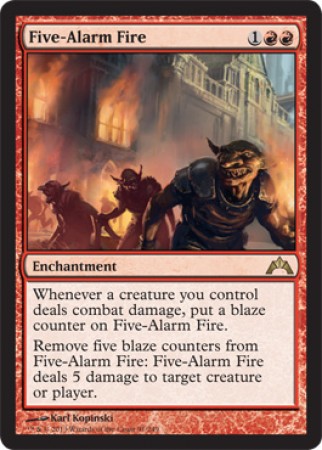
A huge
conflagration sweeps a major city of the land, destroying 50% to
80% of the city.
Property of the
PCs is burned to the ground at the percentage chance =equal= to the amount
of the city destroyed.
The city's population
is reduced by 10% to 40%.
There is a 20% chance
of a plague outbreak and
a 10% chance of
famine.
The price of lumber
and building materials is 10 times normal for the next four<4> months.
The price of food
doubles for one<1> month.

A major flood sweeps
the region.
If on the coast,
severe storms cause the waters to flood the coastal regions.
If along a river,
a series of heavy rains cause the river to rage and overflow its banks,
flooding the bottom land.
The waters rise
5-30 feet (5d6).
Signs of the impending
flood are obvious 2-5 days in advance and levees and dikes can be built
to protect against it.
Once the flood begins,
the waters rise at the rate of 1 /2 foot an hour until the max. is reached.
They remain at their
high point for 4d6 hours and then subside at the rate of 1 foot per day.
Buildings are extensively
damaged, although only those in the path of the raging waters are destroyed.
The population of
the AREA is reduced by 1 % to 10% and the price of all goods is doubled
for 2-5 months.
Normal movement
across the flooded areas is impossible.
If the flood strikes
during the planting season, income from farms in the AREA is reduced by
50% for the year.
If it strikes during
the harvest season, 80% of all farm income is lost and there is a 40% chance
of a famine in 1-3 months (unless steps are
taken to prevent
it).
In addition, all
floods have a 20% chance of causing a plague.
Floods do not
occur in desert or arid regions.
Incursion,
Major: A major migration of creatures enters the kingdom from outside
its borders.
Although this migration is not war it
is not necessarily peaceful. The size of the incursion should be in
proportion to the size of the kingdom.
Thus several hundred creatures would be a major incursion for a small
province, while several thousand creatures
would migrate into a large kingdom. The creatures may be humans,
humanoids, or monsters. The migration
might be a barbarian horde driven from its homeland or a race of
hobgoblins expanding its territory. The
newly arrived creatures attempt to live life as they always have,
retaining their old habits and speaking
their own language. If given to violence and raiding, they continue these
practices. The creatures remain until
driven out. If allowed to stay, they will, over the years, adopt some of
the
habits and practices of the new land until
they are considered a regular part of life. This migration occurs over
a
period of 1d12 months.
Marriage:
The ruler of the land has arranged an important diplomatic marriage involving
either himself || his children.
Such marriages are used to secure alliances,
gain control over smaller kingdoms, settle disputes, or appease overlords.
The marriage is a cause for festivals
&& feasting.
New Religion:
A new religion or a new sect of an established religion appears in the
land, quickly
gaining converts and followers. There
is a 75% chance that this causes hostility and feuding between it and the
established religions, leading to skirmishing,
temple burning, and battles between warrior monks. Both sides
attempt to gain the support of the ruler
of the land. There is a 60% chance the ruler comes out in favor of the
new religion. If so, there is a 40% chance
the ruler bans the other religions, burning their temples, forbidding
their practices, and killing or banishing
their clerics. Rulers often find it convenient to support new religions
as
a tool for breaking the political power
of established religions. The initial arrival of the new religion takes
from
2-7 months, while the feuding between
different sects and religions may last for centuries.

A terrible disease
sweeps the land faster than the clerics<shukenja>
can check it with their spells. <note names of diseases, cf. Fantasy
Needs Reality, Too>
The plague lasts
for 2d6 months.
There is a 40% chance
per month spent in the plague-ridden lands of contracting the disease and
a 60% chance of contracting it if in the company of a diseased person.
The population of
the AREA is reduced by 5% per month.
Those untouched
by the disease and those of neighboring lands are suspicious of strangers.
<TALK modiier = ?>
Traders do not
enter plagued lands and the cost of imported goods increases five<5>
times and the cost of normal goods doubles.
When a plague strikes,
the entire country (unless small) does not
become diseased all at once.
Rather, the plague
moves about, sweeping from town to town like a moving scythe.
Thus a town may
not yet have been hit by the plague, may currently be in the throes of
the disaster, or may have suffered and survived through it already.
Plague (i2 - i/p) +
Yurtrus
(god of plague) +
Morgion
(god of plague) +
Incabulos
(god of plagues) +

A plot to overthrow the present government
is discovered or the ruler of the land is convinced that such a plot exists.
Many nobles and government officials are
stripped of their rank, banished, or executed.
If the PCs hold positions within the government
or are involved in political affairs, there is a 40% chance they are accused
of complicity.
If the characters have powerful enemies,
this chance is increased to 80%.
They must either prove their innocence
or suffer the consequences.
There is a 20% chance that a noble or
group of nobles rises in rebellion.
Spies and secret police are everywhere,
ready to arrest people on the slightest evidence.
The political turmoil lasts for 1-3 months.
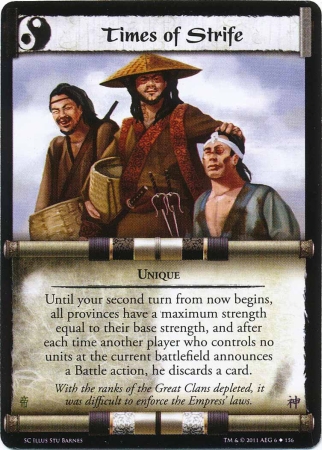
A powerful lord, secret society, religious
sect, army commander, or army of peasants attempts to overthrow the government
in the AREA.
The purpose of the rebellion may be to
gain independence from the government, avoid taxation and brutal treatment,
gain special privileges, or seize the throne. The exact cause of the rebellion
is left to the DM.
Likewise the exact strength of the rebellion
and the final outcome are left for the DM to decide.
If the rebellion involves the PCs in military
battles, it is strongly recommended that the DM use the BATTLESYSTEM™
Fantasy Combat Supplement to create and play several battles with his players.
If these rules are used, the DM can give
the players responsibility for the management and strategy of either the
rebels or the government troops.
This, in itself, will create an entire
series of adventures for the PCs.
If the BATTLESYSTEM™
Fantasy Combat Supplement rules are not used, the rebellion lasts for 1d6
months before succeeding (highly unlikely) or failing. Captured and defeated
rebels can expect no mercy from their masters.
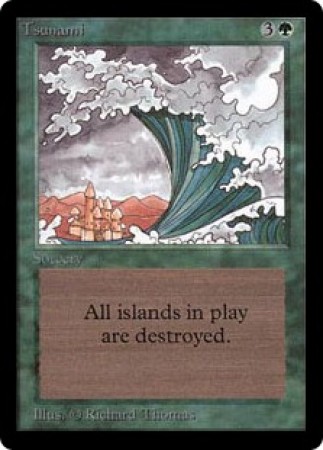
A great wave (as
per the spell tsunami) strikes a 50-mile section
of coastline.
The effects are
the same as the spell. The wave is 100 to 200 feet high when it hits. It
strikes with little warning.
The population of
the area is reduced by 70%. Countries without coastlines treat this event
as no event for the year.
In its aftermath,
there is a 10% chance of plague occurring.
The price of building
materials triples and the price of all other goods doubles in the area.
While the tsunami
strikes quickly, the effect on prices lasts for 1-2 months.

A major deity appears somewhere in the
land, either for good or ill.
News of the appearance travels FAST and
the site is revered || despised depending on the nature of the visitation.
If the site is revered, it becomes the
object of pilgrimages by the faithful.
The religion or sect orders the construction
of a temple || shrine on the site.
If the site is despised, the fortunes
of those in a 5-mile radius fall.
Common folk move away if possible and
the AREA is generally shunned.
It becomes the secret meeting place of
evil followers && monsters.
<Chinese: Shang-Ti,
Chi Sung-Tzu, Chung Kuel, Kuan Yin, Lei Kung, Shan Hai Ching, Yen-Wang-Yeh>
<Japanese: Amaterasu Omikami, Raiden,
Susanowo, Tsukiyomi>

Either a dormant
volcano erupts (70%) || a new volcano appears (30%).
In either case,
the eruption is preceded by tremors && rumblings identical to those
that precede a major earthquake.
When the eruption
occurs, it is of exceptional violence.
All within a 5-mile
radius is destroyed and clouds of thick ash rain down up to 30 miles downwind.
The volcano spews
smoke && ash for the remainder of the month.
Thereafter, the
volcano remains active for 1d12 months, with a 10% chance per month of
another major eruption.
<1.
revise image, 2. make precise links to the WSG, 3. make some minor alteration
of the above text>

Either the ruler of the kingdom launches
a campaign against a neighboring land (50%) or
the kingdom is invaded from a neighboring
land (50%).
The size of the armies range into the
thousands || tens of thousands.
As with rebellion,
the exact causes, forces, and outcome of the war are left for the DM to
determine.
If the DM has the BATTLESYSTEM™
Fantasy Combat Supplement, he may wish to involve the PCs in the war by
giving them commands in one of the armies. One major campaign
is fought per year and lasts from 2-5 months (generally in the summer).
The war lasts for 1-3 years.
PCs are readily accepted into the ranks
of the army and, depending on their actions, may be able to quickly rise
to high rank.
The effects of war are many and varied.
Prices on {the campaign} trail double
II triple, farm incomes in the AREA fought over are reduced by 50%, and
the civilian population generally moves away.
Away from the front, other groups may
take advantage of the situation and stage a rebellion
or uprising.
Press gangs roam the countryside, seeking
new "recruits:"
The younger sons of peasants
desert their homes, seeking fame && fortune as soldiers.
| Tobadzistini (god of war) | Ishtar (goddess of war) | Morrigan (goddess of war) | Nuada (god of war) | Huitzilopochtli (god of war) |
| Chao Kung Ming (god of war) | Huan Ti (god of war) | Anhur (god of war) | Ares (god of war) | Karttikeya (god of war) |
| Hachiman (god of war) | Tyr (god of war) | Enlil (god of war) | Inanna (goddess of war) | Clangeddin (god of war) |
| Kiri-Jolith (god of war) | Hextor (god of war) | Tempus (god of war) | - | - |

Some type of terrible accident occurs in the AREA.
Beshaba
(Goddess of Accidents)
Bad Harvest:
Poor weather, lazy farmers, bad luck, and greedy crows have combined to
yield a poor
crop. Farm incomes of the area are reduced
by 25%. There is a 5% chance of famine occurring. The price of
food increases by 50%. The peasants become
dissatisfied and there is considerable grumbling about ill luck and
bad fates. Often the poor harvest is blamed
on the actions of the ruler of the land. Supposedly, the poor crop is
punishment for his evil actions.
Bad Weather:
The weather throughout the month is particularly foul. During winter, roads
are choked
by blizzards. The air is freezing cold.
In monsoon season, the rains are particularly heavy, turning everything
into a sodden morass. In hot weather,
the weather is exceptionally hot, broiling the characters uncomfortably.
All movement is reduced by 50% with a
like affect on trade. Armies in the field suffer a 15% desertion rate
during the month as the common soldiers
decide they have had enough. During the farming season crops are
damaged, reducing farm income by 15%.
Bandit
Activity: A force of 20-200 bandits
have moved into the area and are being particularly active.
They may have been driven out of a neighboring
region or may have naturally gravitated here. They establish a
stronghold in some remote place, preferably
deep in the mountains. That' have spies and informers in the towns
and villages, appraising them of the movements
of merchant caravans and treasury shipments. There is a base
5096 chance that any caravan moving through
the region is attacked. Lone travelers are robbed 80% of the time.
Should any merchant or official be so
indiscreet as to publicly let out that he is transporting a valuable cargo,
the caravan is automatically attacked.
Of course, mercenary guards are in great demand. If the government of
the area is effective, troops are called
out to drive the bandits from the region (possibly leading to several
encounters suitable for use with the BATTLESYSTEM™
Fantasy Combat Supplement). Merchants and
travelers are suspicious of strangers.
If the government troops are ineffective, the bandits stage raids on the
small villages, robbing their grain shortly
after each harvest. The bandits remain in the area until they are
defeated or the pickings become too slim
to be profitable.
Birth: Should
any of the PCs be married, the character learns at this time that he or
she is
to have a child. The actual birth will
occur in nine months. If this does not apply, a local noble or government
official has a child (95%) or there are
reports of the miraculous birth of a child to a peasant family (5%). Should
the child be born of a noble, it is an
occasion for feasting and celebration for the noble and his retainers.
If the
birth is a miraculous one, it is an event
of great wonder. The child springs from a piece of cut bamboo, appears
from the waters of a spring, is found
in a local shrine, etc. The peasant family is always
hard-working, honest,
and pious. As the child grows through
the years, he will prove to be exceptional in some way-great strength,
cleverness, magical ability, etc. Meanwhile,
the fortunes of the peasant family will rise and they will become
leaders of their community.
Death:
A local noble or government official dies, either of natural causes, war,
or misadventure. If the
position vacated is hereditary, it is
filled by his son. If the noble has no heirs, there is a 30% chance some
other
person has inherited the property, either
through adoption or assignment of rights. In this case the succession
goes smoothly. If the succession is unclear
and there is a strong central government in the land, the fief is
assigned to a new lord by the court. At
the court there is political maneuvering to gain the fief appropriate to
value of the province (furious struggles
erupt for the control of a rich farming province). If the central
government is weak or nonexistent, neighboring
lords attempt to seize the fief through force of arms. This can
lead to armed clashes across the province.
If the vacated position is a government post, the central government
appoints a new official who arrives in
2-7 weeks. During the time before he arrives, no government duties
relating to the post can be resolved.
Thus, upon the death of a magistrate, no cases could be heard or resolved
until the new magistrate arrived.
Earthquake,
Minor: The region is stricken by a minor earthquake, affecting a 5-mile
radius from a
center point chosen
by the DM. Although loss of life is minor, 50% of the buildings in the
area of the quake will
be damaged. There
is a 20% chance of a major fire occurring and a 30% chance of a minor fire.
The earthquake
is preceded by tremors
identical to those that precede a major quake. After the earthquake, the
cost of building
materials doubles
for 1-2 months.
Excessive
Taxes: A new edict comes from the ruler of the land, setting the taxes
upon the peasants at an
impossible rate. The ruler may need to
finance a military campaign, rebuild sections of the kingdom destroyed
in a natural disaster, or may just be
a corrupt, licentious spendthrift. Poorer peasants are driven into poverty
or
debt-slavery. Many are forced to sell
their lands at low prices and take up begging. Everyone tries to find ways
to avoid the new taxes--petitioning for
special exemptions or hiding their goods. There is a 30% chance of an
uprising occurring and a 70% chance of
an increase in bandit activity as the impoverished peasants flee to the
hills.
Famous Person:
A person of great renown, but no official position, has arrived in the
area. The person
is noted for exceptional skill in some
art or craft. It may be extraordinary skill at painting in the classical
style,
mastery of a particularly difficult poetry
form, superb form in a fighting style, brilliance as a philosopher, or
a
reputation for pious behavior. The person
may have a character class and level, like a normal player character,
or may be an NPC with some skill other
than those of the player characters. The famous visitor attempts to
arrive quietly and pass his time without
arousing notice. However, rumors soon get about of his presence and
his reputation. In addition, the person
may have secret reasons for being in the province. The DM can create and
add whatever complications. The person
remains in the area for 1d6 weeks.
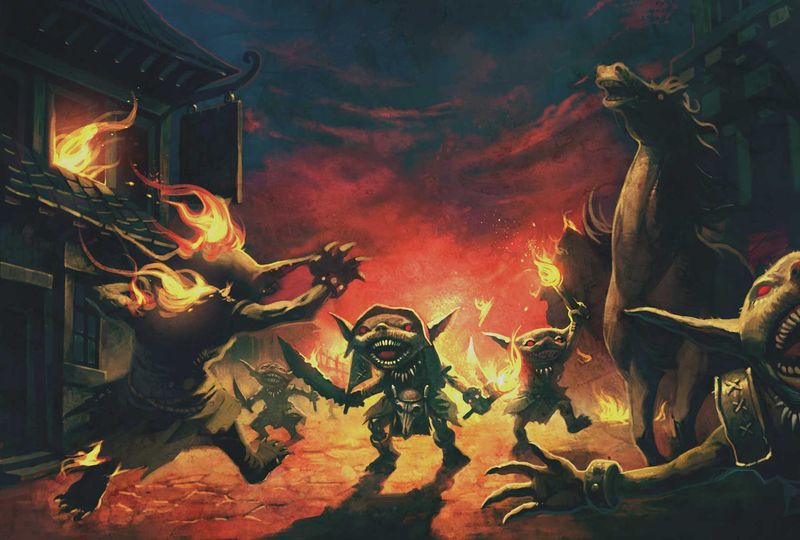
A large fire sweeps
a city, town, or village. If the fire occurs in a city, 10%-40% of the
buildings are destroyed.
If the fire is in a town 50%-70% are burned. If the fire is in a village
8096-10046 are
burned to the ground.
Costs for building materials are double the normal price. Fortunately,
however, loss of
life from the fire
is minor. Minor fires are a useful tool for the DM when he wishes to make
some change in the
buildings or day-to-day
affairs of an established place.

Flooding is a sudden
and less severe event than Floods (on Table 70: Yearly
Events).
Flooding is caused
by the collapse of a levee, dam or dike, or by a sudden cloudburst upstream.
The water
rushes over the
countryside in a great wave 5d4 feet high. The wave is 101-200 feet wide,
centered about the
riverbed of its
source. The wave rushes downstream for 1d6 miles before losing force. It
can easily snap trees,
tear down buildings,
and sweep men away. All those caught in the path of the wave are swept
downstream to
their deaths-unless
they have some type of raft or other flotation device. After this passes
the water level
quickly falls to
a height of 3d2 inches. It remains at this height until the collapsed construction
is rebuilt or the
water naturally
evaporates.
<rename images for flood and flooding, so that they are consistent with the text>
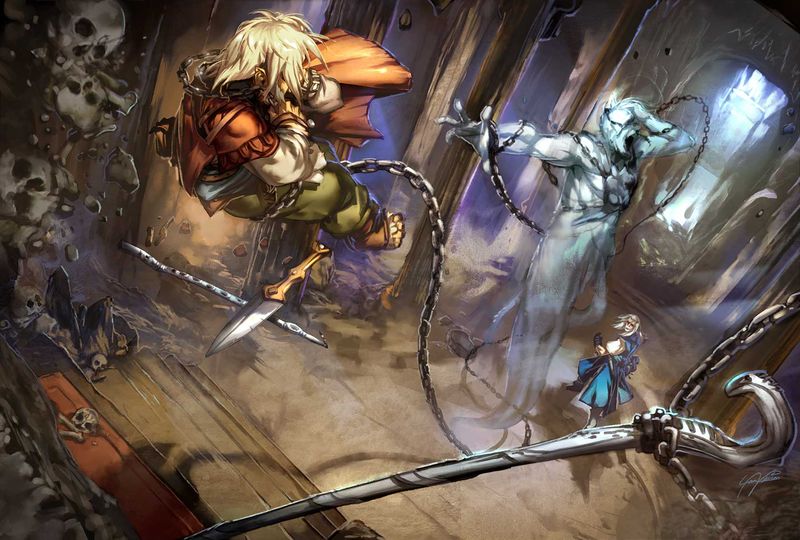
It is rumored that some site in the region
has recently been the center of strange supernatural events--often the
site of a great battle, murder, or accident.
The DM decides whether the haunting is
real or not.
A number of creatures listed in this book
are suitable for a haunted site. <(kuei, et al.)>
This event can be used to provide the
PCs with a ready-made source of adventure.
Hauntings may be simple affairs, or quite
elaborate, with the spirit returning to complete some arduous task left
unfulfilled or to right some wrong (perhaps
committed by the magistrate of the province).
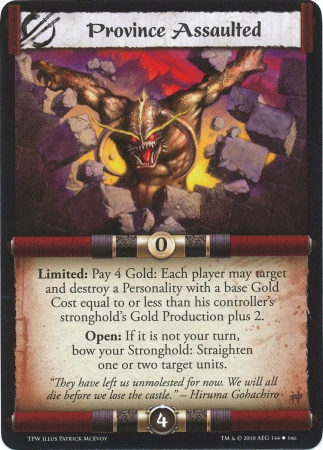
Some creature of great evil and power moves
into the AREA and begins terrorizing
the local villages. The DM should select
the monster, either from those presented in this book or from previous
books. The lair
of the monster is some secluded site hidden from its hunters. However,
the general location of
the lair is known to the local peasants.
They do not attack the monster, afraid of its power. If the monster is
not
defeated or driven away soon, the villagers
make offerings to it as an evil god, hoping to appease it. In addition,
others of its type (or young) appear in
the same area and the infestation becomes stronger.
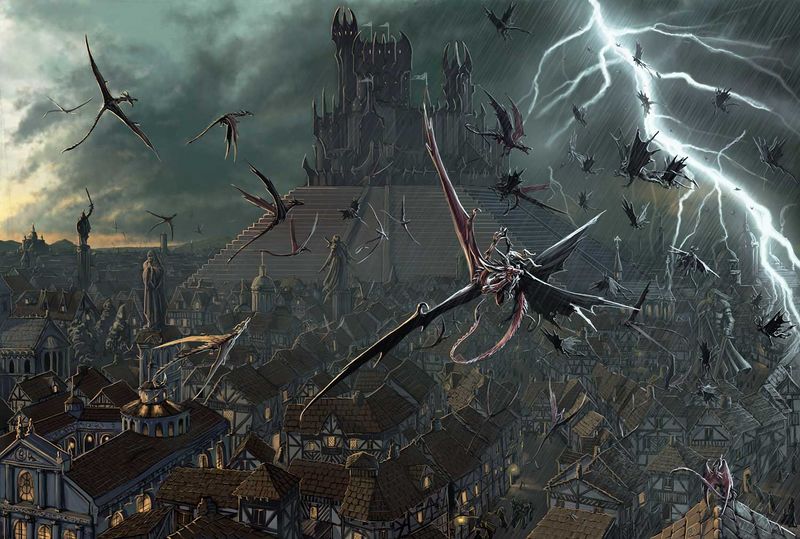
A strong force has moved into the region,
with the intent of establishing a permanent
home here. The force may or may not be
friendly and good. Like the yearly event, the size of the incursion is
relative to the size of the territory.
Unlike the yearly event, this incursion is not a gradual process but a
rather
sudden arrival of people or creatures
from another area. Typical incursions are soldiers invading or retreating,
refugees escaping disaster or war, bandits
or monsters driven from another province, nomads following game,
or even prospectors attracted to a recent
mineral find.
This is identical to a major incursion
except that the forces involved are much
smaller. Such incursions may be a band
of ninjas sent to spy out the province, reinforcements
to a bandit gang,
the punitive expedition of a neighboring
warlord, or the raiding party of a tribe of monsters.
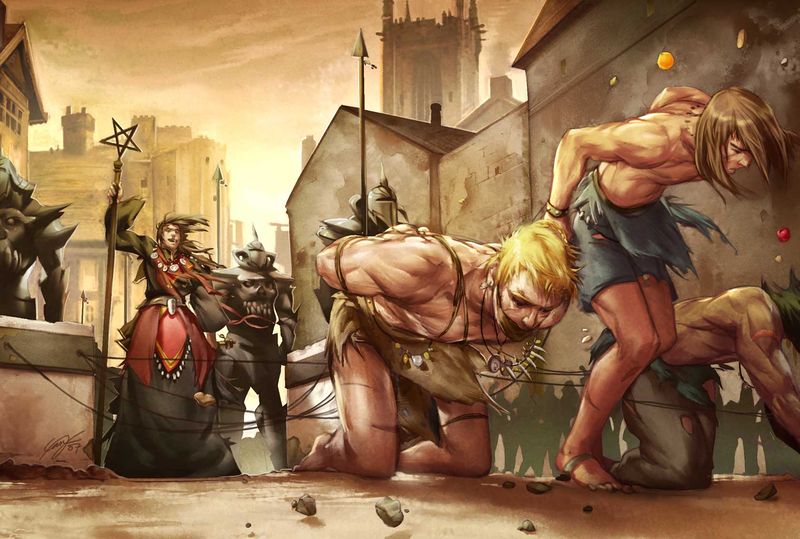
Wickedness has seized control of the local
government and courts. Corrupt and greedy
magistrates and court officials are jailing
and punishing innocent people. This evil may occur because the
magistrate has been bribed, wants to steal
the property of the accused, has been tricked by others, is cruel, or is
exacting official vengeance on rebels
or traitors. Such injustice can be stopped if evidence can be brought to
higher officials (assuming they are not
corrupt) or the PCs decide to act as protectors of the
innocent. There is a 5% chance that a
PC is wrongfully accused of a crime (20% if the PC has a powerful enemy).
Landslide:
This event can only occur in mountainous
or hilly regions. A major landslide or avalanche
has blocked one
of the main roads of the province. The road cannot be used until the landslide
is cleared. The
peasants must be
mobilized to clear the road and the work takes 1-2 weeks unless spells
are used to speed the
task.
Maiden
of Virtue: A young woman of exceptional grace, wit, and beauty has
appeared in the region.
She may be the daughter of a powerful
noble (50%), a maiden of mysterious and magical origin (30%), an
exiled princess (10%), or simply a commoner
(10%). She charms and impresses all who meet her. She has an
exceptionally fine writing style that
reveals her pure nature. She is skilled in the playing of musical instruments
and other artistic accomplishments. She
is properly respectful of her parents (if she has any). If the maiden is
any but the daughter of a powerful noble,
she can be courted (and possibly wed) without the full formalities.
However, being aware (but not vain) of
her own qualities, she does not accept just anyone. Her accepted suitor
must possess exceptional qualities of
his own. He must also be a model of virtue and likewise skilled in the
arts.
He must possess heroic qualities. To even
attract her notice, he must produce some artistic item of quality-a
poem, painting, exceptional handwriting,
etc. He must also have a Comeliness and Charisma of at least 13 each.
Maidens of mysterious origin or princesses
may set impossible tasks as a condition for any successful suitor.
The social rank of the character is not
as important as the qualities mentioned above. The handling of the
courtship, the degree of attraction between
the two, and the final result of any courtship are left in the capable
hands of the DM.
Major Battle:
A large and important battle is fought in the region. As with war and similar
events, the
DM must decide the forces involved on
each side and the site of the battle. Use of the BATTLESYSTEM™
Fantasy Combat Supplement is strongly
recommended to resolve this battle, possibly giving the player
characters command of units on one side.
If this approach is not used, the DM must determine the outcome of
the battle. Prior to the engagement, there
are many troops moving through the area (possibly creating many
interesting encounters). After the battle,
the losers are forced to retreat, possibly in flight. During this retreat,
many peasants take up arms to protect
their villages and hunt down the losers. Patrols of the victorious force
scour the countryside looking for stragglers,
deserters and small bands of the enemy.
A leopard,
tiger,wolf,
or similar creature has acquired a taste for human flesh and is raiding
the local villages, carrying off women,
children, and farmers in their fields. The animal strikes once or twice
a
week, killing its prey and dragging it
off into the woods. The villagers are paralyzed by fear, unwilling to
venture outside alone or after dark. They
petition the government, a powerful NPC, or the player characters for
aid. The maneater remains active until
captured or killed.
Marriage:
Should one of the PCs currently be courting a member of the opposite sex,
his
or her proposal of marriage is accepted
(unless the DM rules this does not happen for other reasons). If this is
not the case, an important or influential
person in the region either marries or completes the marriage
arrangements for one of his children.
If the PCs are known to the NPC, they are invited to attend
the wedding. In any case, the wedding
is cause for feasting && celebration.
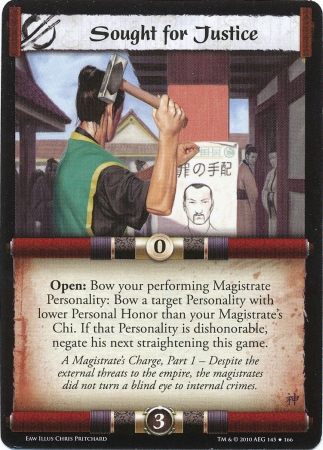
A wanted villain is rumored to be in the
AREA.
He may be a banished lord who has secretly
returned,
a traitor fleeing the wrath of the emperor,
an escaped convict, a famous bandit, etc.
There may be a reward posted for the capture
or slaying of the criminal.
His presence may only be a rumor, leading
to nothing but a wild goose chase.
Plague: See Plague in yearly events.
Recruiting:
Men are needed to shoulder arms and special measures are taken to recruit
soldiers. These
include enforced levies of peasants, bounties
offered to capable officers, and recruiting gangs. There is a 2046
chance the characters are swept up by
one of these gangs. If the characters do not want to be hustled off to
the
front line, they will have to do some
fast talking (or something!).
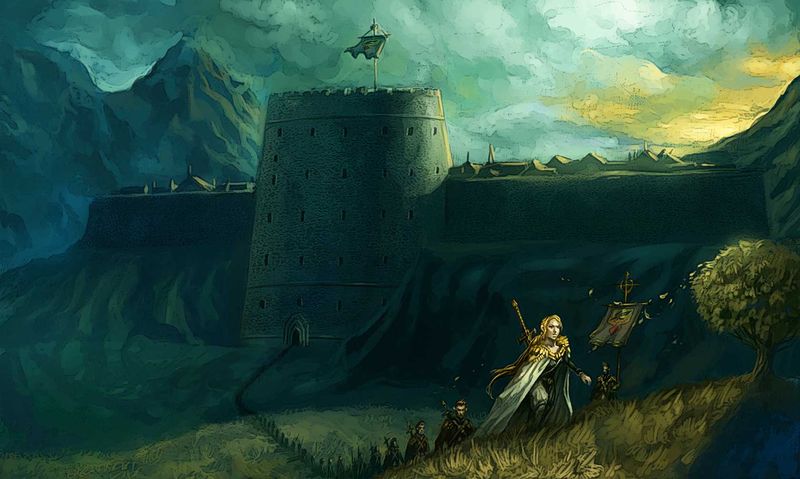
Organized groups of soldiers, either friendly
or enemy (or perhaps both at different
times) sweep through the province. In
either case there is a fair amount of looting and collections of rice,
grain,
and horses. No repayment can be expected
for this, although notes may be issued for items taken. There is a
10% chance any character is arrested as
a spy. Ninja characters are given orders to spy on the enemy 40% of the
time. Friendly troops do not engage in
wholesale pillaging and neither do enemy troops (most of the time).
Barbarians and enemies on raids burn buildings
and cause as much damage as possible in addition to carrying
off anything of value.
Dissatisfied with their poor lot, the peasants
rise spontaneously in rebellion. They may be
protesting against injustice, excessive
taxes, or their general misfortune. The uprising begins in one or two
villages and spreads quickly to the other
rural areas of the region. The peasants arm themselves with whatever is
at hand-farm implements and weapons they
have gathered from samurai they have hunted down. Only 1096 of
the peasants involved have proper armor.
There is a 60% chance that any monastery in the area supports them,
giving them troops, shelter and aid. The
peasants have no military plan or strategy, simply attacking and
ambushing any troops and officials of
the government they find. If a strong leader should arrive in their midst,
they can be trained into an effective
fighting force in 2-4 months. Of course, uprisings are dealt with severely
by
the government and reinforcement troops
are dispatched to deal with them. No mercy or quarter is shown, a fact
that causes the peasants to fight to the
death. When an uprising occurs, there are many positions the player
characters can fill-leaders of the uprising
or commanders for the government troops being the most common.
Unless the PCs manage to swing the balance
of power the uprising is doomed to failure and all
who took part (and their families) are
executed if captured. However, the effort may not bra futile, as there
is a
70% chance the government listens and
reacts to the complaints of the peasants, possibly lowering taxes or
replacing the officials of the area. There
is a 70% chance that there is increased bandit activity in the area for
1-3 months after the uprising, as the
surviving peasants take to the hills to escape punishment. As with war
and
rebellion, the DM must determine the size
and type of the forces involved and use of the BATTLESYSTEM™
Fantasy Combat Supplement is recommended.
Vengeful
Stranger: A mysterious NPC arrives in the area, searching for a particular
person. He travels
through the region making discreet inquiries
in the villages and towns. He seeks revenge for some past wrong
(possibly a murder or insult). If the
player characters have offended or wronged some family or person in the
past, the stranger is looking for them.
He learns their whereabouts 70% of the time. The DM can use this as the
basis for an adventure for his player
characters. If the stranger is not looking for the player characters, he
may
enlist their aid in his search (or his
prey may do the same). Most often the local government is neutral in the
matter, but if the DM decides, the local
officials may attempt to intervene and end the feud. Should the stranger
be hunting for the player characters and
they defeat him, this will be cause for an ancestral feud between
the-two families.
VIP Visit:
An important official comes on a formal visit to the province. The purpose
of his visit is left
to the DM to decide. If he has arrived
to investigate the misdeeds of the local officials, they certainly try
to
eliminate him. However, in this case he
is traveling in disguise. Player characters may be hired to protect the
VIP or do away with him. Otherwise the
visit is marked by official banquets and feasts (which the player
characters may be invited to attend).
Daily events are the most common type of
encounter and the ones that most frequently involve the
PCs. Whereas yearly and monthly events
form a backdrop for the campaign, daily events provide
much of the action for the player characters.
Daily events include encounters with creatures and special
summons the player characters may receive.
Player characters can have up to three
events in a single day, depending on the PCs' location. To
determine the number of daily events possible,
consult the chart below.
| Court | 0-1 events possible per day |
| City, town | 0-1 events possible per day |
| Rural area | 0-2 events possible per day |
| Wilderness | 0-3 events possible per day |
| Sea, ocean | 0-2 events possible per day |
To determine the daily event, if any, roll
percentile dice on the column of Table 73: Daily Events that best fits
the current location of the PCs for that day.
Thus, if the PCs are currently traveling
across a lonely mountain pass, the Wilderness column would be used.
If the PCs descend from the pass and reach
an AREA of farmland and villages, the Rural column would be used.
The max. number of events are rolled for
in the AREA--in wilderness, three die rolls would be made.
However, many of these die rolls
may result in no event.
Table 73: DAILY EVENTS
| Die Roll | Court | City/Town | Rural | Wilderness | Ocean |
| 1-50 | - | - | - | - | - |
| 51 | Contest | Duel | Bandits | Bandit camp | Becalmed |
| 52-53 | Contest | Duel | Bandits | Monster | Becalmed |
| 54-55 | Contest | Duel | Bandits | Monster | Monster |
| 56-60 | Contest | Entreaty | Bandits | Monster | Monster |
| 61-63 | Duel | Fire, small | Crime | Monster | Monster |
| 64-65 | Duel | Insult | Crime | Monster | Monster |
| 66-69 | Entreaty | Insult | Haunting | Monster | Monster |
| 70 | Illness | Insult | Haunting | Monster | Monster |
| 71-72 | Illness | Invitation | Monster | Monster | Monster |
| 73-77 | Invitation | Invitation | Monster | Monster | Monster |
| 78-79 | Invitation | Kidnapping | Monster | Monster | Pirates |
| 80 | Maiden | Maiden | Monster | Monster | Pirates |
| 81 | Maiden | Maiden | Stranger | Monster | Pirates |
| 82 | Maiden | Monster | Stranger | Nobles | Pirates |
| 83 | Monster | Monster | Stranger | Ruins | Pirates |
| 84 | Plot | Monster | Shrine | Ruins | Pirates |
| 85-86 | Plot | VIP | Shrine | Ruins | Pirates |
| 87 | Special | VIP | Shrine | Ruins | Pirates |
| 88 | Special | VIP | Shrine | Ruins | Ship |
| 889-90 | Special | VIP | Mystery | Shrine | Ship |
| 91 | Special | VIP | VIP | Shrine | Ship |
| 92 | VIP | VIP | VIP | Storm | Ship |
| 93 | VIP | VIP | VIP | Storm | Storm |
| 94 | VIP | VIP | VIP | Stranger | Storm |
| 95 | VIP | - | VIP | Traveler | Storm |
| 96-98 | VIP | - | - | Traveler | Storm |
| 99-100 | VIP | - | - | Traveler | Land |
Explanation of Daily Events
Bandits: The
PCs, through accident or design, find a camp or outpost of a bandit
force operating in the AREA.
If there are bandits active in the AREA,
the characters come across the outer edges of a bandit camp.
There are 2d10 bandits present.
They attempt to delay or waylay the characters
while two of their brethren return to the main camp for help or to sound
the warning.
If there are no active bandits in the
AREA, the encounter is with an advance group moving into the area.
The player characters encounter 3d10 mounted
bandits.
If possible, the bandits AVOID a fight
(since they are here to scout).
They may attempt to pass themselves off
as travelers.
If the bandits are clever and the players
are not, the bandits may succeed in fooling the PCs in which case nothing
happens in the encounter.
Bandit Camp:
The PCs have accidentally stumbled onto a bandit camp in the wilderness.
The referee should create the camp according
to the info given in the MM
book. <>
Becalmed:
The winds die out and the sea becomes perfectly still.
Ships cannot sail this day and must be
rowed.
Contest:
The PCs (if of noble station) receive an invitation to a contest from a
powerful
lord. The contest is in one of the arts-poetry,
painting, calligraphy, etc.-that at least one of the PCs
has proficiency in. The time and place
for the contest is already set. When held, the contest takes the form of
a
formal party. Each guest is supposed to
compose a work on the spot that is then judged according to the quality
of the work, the appropriateness to the
occasion, the imagery, and the sheer beauty. The winner of the contest
receives a minor gift and gains honor.
The contest can be missed if there is a good reason (leaving town at the
orders of one's lord, etc.). If the player
characters do not attend (and do not have good reason), they lose 2
points of honor. It is assumed that they
are ashamed of their own skills.

Some crime, petty or notorious, has occurred
and the PCs are privy to it. They may
be friends of the victim or the accused
(or they may bathe victim). They may be witnesses to the crime. They
may be requested or ordered to help catch
the criminal. The DM can use this encounter as a basis for the
beginning of an adventure with the PCs.
Duel: One of
the player characters is challenged to a duel. This can be for several
reasons. The character
may have accidentally insulted an NPC
or publicly embarrassed him. The NPC may have come looking for the
player character, having heard of his
fame. h may be a case of mistaken identity. The NPC may have an old
score to settle with the player character
or his family. Note, shukenja are never normally challenged to a duel.
Entreaty:
A lower ranked noble or a group of commoners comes to the PCs requesting
a
special favor. A noble may want the player
characters to recommend him to an NPC the PCs are
familiar with or he may want them to do
some deed that is beyond his station or power. He is willing to pay or
even bribe the player characters. A group
of peasants may be looking for warriors to protect their village from
bandits, drive away an evil spirit, or
avenge some wrong done to them. The DM should use this encounter as the
starting point for an adventure for his
player characters.
Fire,
small:
A fire breaks out in a building not far from the PCs. They are expected
to aid
in
the firefighting. This may mean organizing the work or simply being part
of the bucket brigade. If this
encounter
occurs while the player characters are at home, one of their buildings
will be on fire. The fire will
have
been intentionally set 70% of the time, either by an enemy of the player
characters, ninjas attempting to
create
a distraction (thereby slipping past the player characters), or a malicious
spirit. If not fought quickly and
effectively,
the fire will burn out of control. Out-of-control fires have a 70% chance
of igniting nearby
buildings.
Haunting: See Haunting in the monthly events.
Illness: A
disease
strikes one of the PCs (20%) or an NPC known to them (80%). The
disease is quite dangerous. The first
indications of the illness start the day the encounter is rolled. The DM
must
roll 2d6 to determine the number of days
required for the disease to run its course. Each day untreated, the sick
person becomes worse in condition-high
fevers, sweating, dizziness, weakness, etc. At the end of the time
period, if the disease has not been cured,
a saving throw versus death must be made. If the save is failed, the
invalid dies. If the saving throw is made,
the person begins to recover. Sick characters are required to rest and
recover one day for every day spent ill.
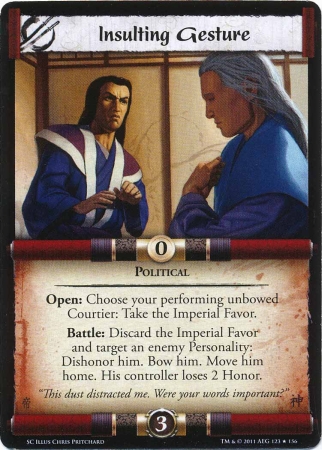
One of the PCs, intentionally || inadvertently,
insults an NPC.
If the NPC is of the PC's status or higher,
he demands satisfaction.
If this occurs at a court, the aggrieved
party presents his complaint to the ruling lord, who takes some type of
action on it.
Should this punishment be inadequate or
the aggrieved is of lower standing, the PC has made a long-term enemy who
will attempt to cause harm in the future.
Invitation:
The PCs have received an order, politely phrased as an invitation to call
upon a
powerful lord. The exact purpose of the
invitation is left to the DM. Typical reasons include celebrating births,
christenings, marriages, or receipt of
offices; outings to view the moon, admire cherry blossoms, or go hunting;
political maneuvers to receive special
instructions, embarrass a third party, or compromise the player characters;
or, rarely enough, purely social calls.
These invitations are by no means casual affairs. Proper decorum and
respect must be observed at all times
when attending. Of course, to refuse without justifiable reason is cause
for
an insult.
Kidnapping:
An attempt is made to kidnap a player character or an NPC known to the
player
characters. The reason for the kidnapping
can be anything the DM desires. A powerful lord may have sent
ninjas to keep someone out of the way
or ensure their cooperation. Bandits or yakuza may be attempting a little
extortion. A jealous lover may be removing
his competition. It may even be that a pair of lovers has secretly run
away under the guise of a kidnapping.
Obviously, this encounter can lead to further adventures for the player
characters.

Land is sighted. Depending on the location
of the ship, the land may be a section of the coast of
their intended destination, an island
along their course, or some small uncharted island. Such uncharted lands
are certainly filled with all manner of
unusual and dangerous creatures (perhaps even dinosaurs && gargantua!).
Monster: Roll on the appropriate monster table to determine the encounter.

A strange or supernatural event occurs
in the area the player characters are in. They may
witness it themselves or may hear about
it indirectly. The event (which must be described by the DM) may have
been caused by spirits, a powerful spellcaster,
a cunning creature, or even a manifestation of a deity. There is a
60% chance the player characters are asked
to investigate the event.
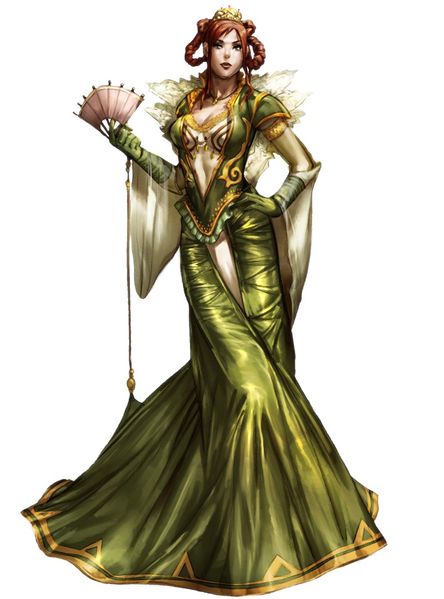
A noble party of 2d10 bushi, 1d6 samurai,
and 1-3 persons of rank are encountered. They are
traveling openly 80% of the time. However,
the other 20% of the time, they are traveling in disguise. If
traveling openly, they expect all respect
due their station. They are traveling on foot, with the nobles carried
in
palanquins. If traveling in secret; they
may be on a special mission or fleeing a powerful enemy. They are either
on foot and dressed as common peasants,
or mounted dressed as wandering samurai && bushi. If dressed as
peasants,
they are forced to swallow their pride and act in an appropriately humble
fashion.
Pirates: 1-3
ships of wako are sighted.
See the description of Men, Wako
in this rulebook for further explanation. <e>
Plot: The PCs
get wind of a plot against their lord or a powerful NPC known to them.
What the characters do with this information
is up to them.
This encounter can be used as the basis
for a PC adventure.

The characters come across a set of ruins.
The DM can decide the type of ruins or roll on the
table below. The number given in parentheses
after each entry is the chance that the ruin is haunted by some
type of spirit or inhabited by some type
of monster.
| Die Roll | Ruin Type |
| 01-10 | Temple compound (70%) |
| 11-60 | Farmhouse (20%) |
| 61-90 | Shrine (50%) |
| 91-100 | Military Stockade (30%) |
If the ruins are haunted or occupied, the DM must determine the type of creatures presently there.
Ship: A sail
is sighted on the horizon. There is a 30% chance it is a ghost
ship, ferrying the dead to their
new land. Otherwise the ship is a merchant
vessel (50%) or warship (20%). If the vessel is either of the latter
two, there is a 10% chance it is crewed
by gajin undertaking the long and dangerous voyage (or blown
hopelessly off course).
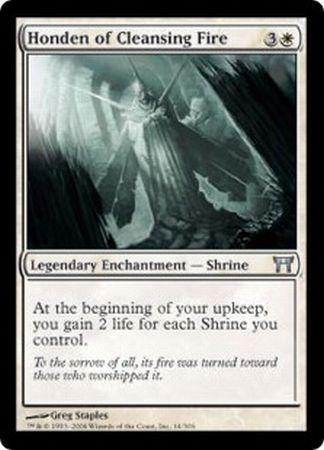
The PCs come across a small
shrine to a local deity.
There is a 10% chance that if they stop
and make appropriate offerings they receive the benefits of a bless
spell for the next 24 hours.
If the PCs damage or are disrespectful
to the shrine (whether intentionally or not), there is an 80% chance they
are struck by some curse of the DM's devising.
Special: One
or more of the PCs receive a special mission from their lord, mentor, or
head
of the family. Thus, a ninja character
may be given a mission, a yakuza may have to gain
special information, a
shukenja may
be sent on a quest, or a samurai may be entrusted with an important message
to deliver. The DM
should use this encounter as the starting
point for an adventure for the PC.
Storm: A fierce
storm strikes.
If at sea, it has gale force winds, driving
rain, and huge crashing waves. It lasts for 5d6 hours.
If on land, the storm is appropriate to
the season with either driving rain, lightning, and fierce wind or whipping
snow, freezing cold and winds.
In deserts it is a sandstorm.
In any case, the characters are unable
to travel that day due to drifting, flooding, sand dunes, etc.
Standing outside during the storm is physically
exhausting and exposed characters suffer 1-2 points of damage per hour.
Stranger:
An unknown NPC encounters the party and displays an inordinate amount of
interest in them.
He is either an ordinary traveler (30%),
a member of a secret society (10%), an official of the secret police
(10%), a ninja on a mission (10%), a noble
traveling in disguise (10%), a bandit wanting
to use the characters as
cover (10%), a hengeyokai or spirit in
human form (10%), or a yakuza attempting to subtly gain information
(10%). He is traveling in the same direction
as the characters and usually wants to travel with them for company
and safety. He may or may not be a threat
to the PCs, depending on the DM's whim.
Traveller:
A person is encountered while traveling through an AREA.
He has no special interest in the PCs,
but is going in the same direction and
accompanies them for at least a little ways (if allowed).
A traveller can be any sort of person --

A noble or important official makes a state
visit or passes through the AREA the PCs
are in. No attempt is made to hide his
arrival. His entourage includes 20d6 bushi and
10d4 samurai plus assorted
servants. Moving through the streets in
advance of him, they announce his title and force the commoners aside
with blows and drawn weapons. Any impudent
enough to challenge them are cut down on the spot. All are
expected to get out of sight or bow as
he passes.